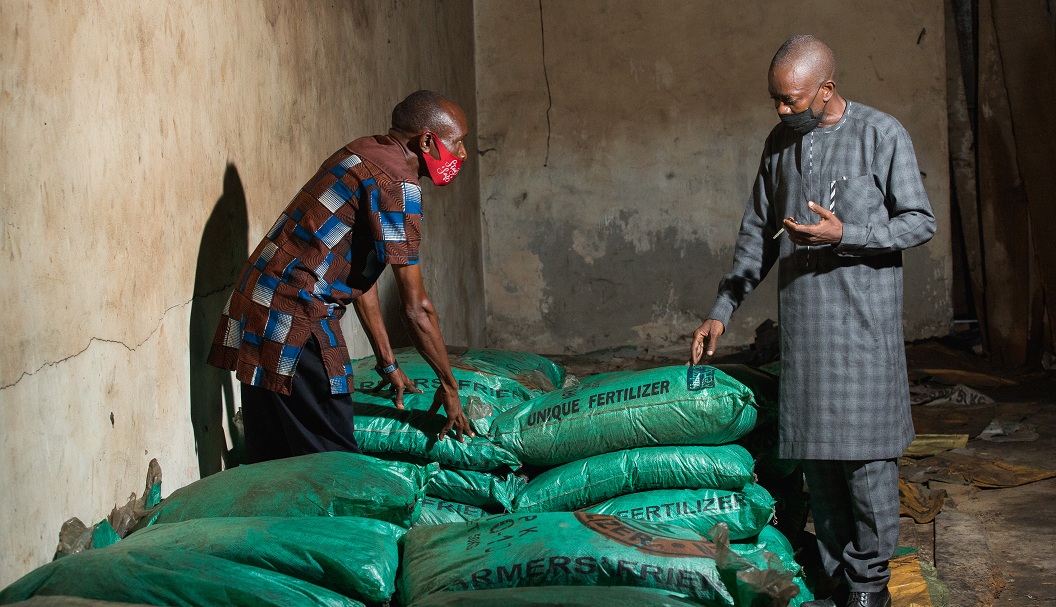REDUCING POVERTY
Surviving the COVID-19 Threat: Palm Oil Sector
Our palm oil-value-chain project helps smallholder palm oil farmers and processors increase their sales through the increased quantity and quality of their outputs. They earn more income; create new jobs by adopting best management practices; and access improved processing and harvesting technology, improved seedlings, funding, and market linkages.
Summary of Outcomes in 2020
13,524 Reached
8,555 Increased their Productivity
NGN 1.9 Billion Leveraged
2,689 New Jobs Facilitated
TAKING AGRO-INPUTS TO THE NOOKS AND CRANNIES: I THINK I AM NUMBER ONE (1)!
“I am Akandu Godwin from Port-Harcourt, Rivers State. I deal on agro-input, mostly fertilizer and agrochemicals. I received some orientation and training from PIND (on palm oil best management practices) in 2018—2019 and started officially partnering with them. Since I met with PIND in the first place, they broadened my knowledge. They added value to my business, so it’s not just to tell a customer, “please buy fertilizer.” Now, I can tell them the right fertilizer to buy and the method of application, and those things have increased my output. In fact, it is affecting my business positively because I am selling more product (agro-inputs) now. I am more widely known than before. And why? I am visiting communities, rural areas, all nook and crannies of Rivers State, training and advocating (for best management practices and improved seedlings to palm oil farmers). As you are training, you are as well introducing your products, telling them where your warehouse is and all the rest. Since I started with PIND, I have opened four (4) more centers in various locations. My knowledge is spreading. I have gotten more customers all over the place because I am reaching them out there, going from communities to communities. When you ask of agro-dealers, I think I am the number one (1) in Rivers State”.
The palm oil value chain consists of farmers and processors supported by agro-dealers, millers, fabricators, and farm service providers FSPs). Farmers own or rent farms to produce fresh fruit bunches (FFBs), which the processors buy and process into palm oil for sale. Millers charge processors a fee for the use of their processing machines.
Palm oil farmers and processors need information on best management practices and access to inputs and technologies to improve their yield. This information is supplied by agro-dealers, FSPs, and equipment fabricators. The COVID-19 crisis limited processors’ access to the market, as they could not deliver products to off-takers and big traders due to transportation hikes. So, processors had to sell in makeshift local markets within their communities. This led to a drop in palm oil prices, the shrinkage of cash flows, and difficulty getting working capital from banks. They also faced an increase in the cost of labor and the cost of milling. Palm oil farmers suffered a 36 percent to 43 percent increase in the price of fertilizers and had difficulty accessing services.
Agro-dealers and FSPs worked collaboratively amongst themselves and with palm oil farmers and processors to create a win-win for all actors in the sector. The relationship between these service providers played a crucial role in ensuring access to inputs for palm oil farmers to use on their farms. This helped to improve their productivity and yield as well as pricing information for informed sales decisions. And fabricators ensured the millers’ equipment was in working order. This ensured the continued availability of palm oil for sales and income for the farmers and processors.
Agro-dealers provided advisory support and information on inputs to farmers via phone calls. They strengthened their relationships with FSPs through socially distanced one-on-one (1-on-1) engagements during the peak of the COVID-19 restrictions. They also held socially distanced physical demonstrations and trainings for a small group of palm farmers.
Poor quality palm oil seedlings have led to lower incomes for farmers and created a demand-supply gap in the sector. To forge a steady supply chain for improved seeds to palm oil farmers, PIND has been building the capacity of private nursery operators and linking them to sprouted nut-producing companies. To expand the distribution network, PIND trained 147 nursery operators and linked them to seed producers like PalmElit CIRAD, Nigerian Institute for Oil Palm Research NIFOR, and ALLISSEE Seed Company.
Following this, PIND further linked PalmElit CIRAD to 80 business finders made up of nursery operators and agro-dealers to market the improved palm oil seedlings to farmers with the incentive of NGN 100 per seedling bought by farmers. The expanded distribution network and strengthened relationships between seed producers, nursery operators, and agro-dealers led to the purchase of 246,265 quality seedlings by 521 farmers in the four (4) states of Akwa Ibom, Delta State, Imo, and Ondo.


